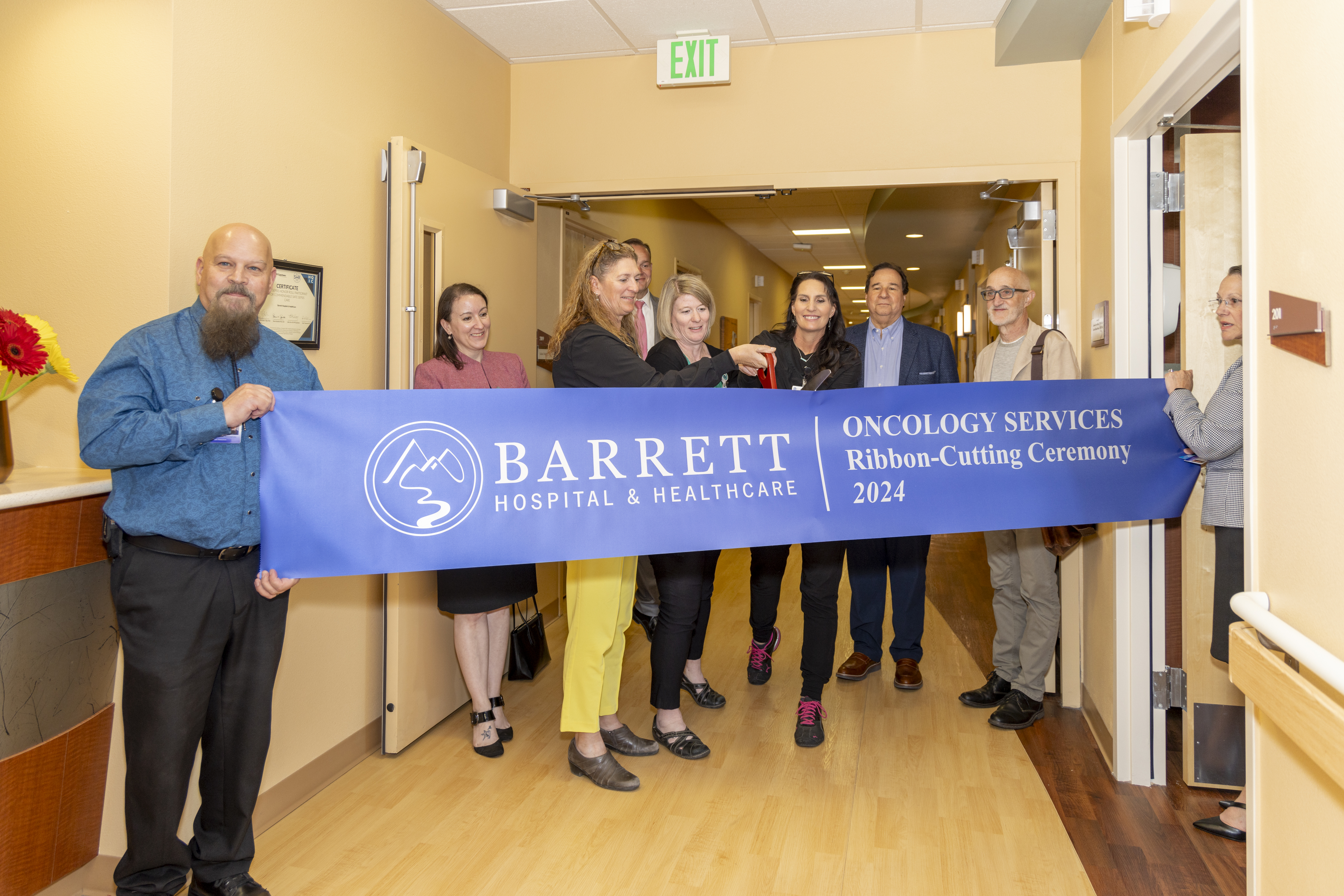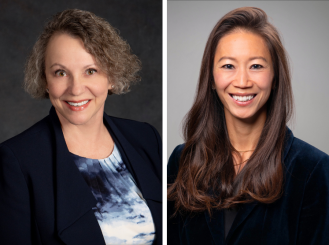Back to Alliance Media and Publications
New Infusion Suite Brings High-Quality Cancer Care to Rural Montana
October 14, 2024
 Ribbon cutting ceremony for the new infusion suite, September 30, 2024. Photo Credit: Shanna Mae Photography.
Ribbon cutting ceremony for the new infusion suite, September 30, 2024. Photo Credit: Shanna Mae Photography.
How Conquer Cancer ®, the ASCO Foundation is Bridging the Gap in Needs, Services for Montana Patients
ASCO is committed to helping ensure every patient, everywhere, has access to high-quality and equitable cancer care. In 2022, the Society launched a multiyear pilot program to increase access to cancer care in rural Montana. This program enables patients to receive cancer care in their own community through a hub-and-spoke care delivery model, a proven method of extending access to cancer care in rural and remote areas. The initiative, which aligns with the Montana Cancer Coalition’s comprehensive cancer control strategy, aims to reduce the distance patients travel for treatment, enable rural sites to be primary points of contact, improve care delivery through education and training, and encourage patient engagement.
 Carolyn Hansen, chief clinical officer of spoke site Barrett Hospital & HealthCare and Giovanna Kha Marino, oncology nurse manager at the program hub site Bozeman Health Cancer Center
Carolyn Hansen, chief clinical officer of spoke site Barrett Hospital & HealthCare and Giovanna Kha Marino, oncology nurse manager at the program hub site Bozeman Health Cancer Center
Two practitioners, Carolyn Hansen, chief clinical officer (CCO) at the spoke site Barrett Hospital & HealthCare, and Giovanna Kha Marino, oncology nurse manager at the program hub site Bozeman Health Cancer Center, discuss how they are working to deliver care to Montanans through this groundbreaking program.
What is your role at your site and how does your role fit in with the overall care delivery process and the hub-and-spoke model?
CH: As the CCO at Barrett Hospital & HealthCare, my role is to oversee the clinical operations and ensure that we deliver high-quality, patient-centered care. In the context of our cancer care services, my responsibilities include coordinating various departments to provide a seamless continuum of care, from diagnosis to treatment and recovery.
The hub-and-spoke model played a crucial role in our strategy for developing cancer care services in Dillon, MT, laying the foundation for the service line. My role involves ensuring strong communication and collaboration between the entities involved in the pilot, allowing us to effectively manage patient referrals to Dillon, share resources, and provide comprehensive support across the patient’s journey. By doing this, Barrett Hospital & HealthCare aims to enhance access to cutting-edge cancer treatments while maintaining the personalized care that every patient deserves, and expects, not only here in Dillon, but in Beaverhead County.
GKM: As the oncology nurse manager at Bozeman Health, I oversee infusion, medical, and radiation oncology nursing teams, focusing on operational and clinical aspects. I am dedicated to fostering collaboration and building partnerships across multidisciplinary care teams. I am “patient-obsessed,” which is part of why I strive for system-based practices that ensure safe, high-quality, and patient-centric care. It has been a huge honor to play a key role in the partnership between Bozeman Health and Barrett Hospital. By sharing expertise and best practices from our cancer center, I’m helping our Barrett Hospital colleagues establish essential oncology services for Dillon and the surrounding communities.
Why was it important for the hub-and-spoke sites to participate and to partner with ASCO in expanding cancer care services in the area?
CH: Participating and partnering with ASCO in expanding cancer care services was crucial for Barrett Hospital & HealthCare because it allowed the hospital to enhance the accessibility and quality of cancer care in rural areas. In many rural communities, access to specialized health care services is limited due to geographic and resource constraints, and many rural communities are unable to provide resources such as cancer care alone. By collaborating with a renowned organization like ASCO, Barrett Hospital & HealthCare can leverage additional expertise, resources, and training to offer state-of-the-art cancer care treatments locally. This partnership will help improve patient outcomes, reduce the need for patients to travel long distances for cancer treatment, and increase awareness and education about cancer prevention and care within the rural community. Such collaborations can significantly improve the overall standard of health care and ensure that [patients in rural areas] receive timely and effective cancer treatments close to home, surrounded by the support of their local community and loved ones, which contributes to better health outcomes.
GKM: Montana, the fourth largest state covering 147,040 square miles, has just over 1 million residents—about the same number as the city of Dallas. This vast, majestic landscape fosters a unique and deeply rooted sense of pride and resilience among Montanans. However, the sheer size of our state poses significant challenges for rural health care, particularly in cancer care.
Access to specialized care—including oncologists, advanced practice clinicians, oncology nurses, and oncology social workers—is constrained by both our population size and geographic spread. Patients often travel long distances, sometimes hundreds of miles one way, to see a member of their care team or receive treatment. This travel imposes considerable financial, physical, and emotional burdens on patients and their families.
At Bozeman Health Cancer Center, we're dedicated to offering the latest cancer treatments through a collaborative, multidisciplinary approach. We recognize the ongoing importance of partnerships with other facilities to continually advance in cancer care and maximize the use of additional technological and medical resources. We aim to provide exceptional care while keeping patients near their homes, support networks, and communities because we understand that it truly takes a village to support each patient.
To tackle these challenges, we are dedicated to exploring innovative solutions and strengthening partnerships to ensure that every Montanan receives the comprehensive cancer care they deserve.
What barriers have you faced while implementing expanded care services in your patient and geographic community? Can you describe some significant challenges and how you overcame them?
CH: Implementing expanded cancer care services at Barrett Hospital & HealthCare has been both a rewarding and challenging journey. One challenge we have faced is filling the necessary nurse navigator position. It has taken over 2 years to fill the role. We have had candidates apply whose salary expectations were unrealistic and who were not interested in living in rural America. Additionally, the lack of immediate availability of nationally recognized shopping centers and the cost of housing were major contributors to the lack of candidates.
Barrett Hospital & HealthCare, grateful for the support of ASCO and the Merck Foundation grant to help with education and training, recognized the need for additional funding support for this collaboration. Our grant department wrote several grants to Montana-based funders, and we have received monies to support the nurse navigator salary. These efforts have significantly enhanced the quality and accessibility of cancer care services for our community.
GKM: We would not be able to overcome barriers to care and implement effective solutions without the generous support of ASCO and the Merck Foundation. Geographic challenges further complicate the continuity of care, adding financial strain on both patients and health care facilities. Also, the shortage of health care professionals in rural areas affects the availability and consistency of care, particularly for the comprehensive services needed to holistically support [patients with cancer] throughout their treatment journey.
Over the past 2 years, our cancer center has expanded to five medical oncologists and two radiation oncologists. Building and maintaining a specialized oncology workforce takes a lot of time, but it is essential for managing the complex care coordination that rural settings demand. Retaining our current care team of providers is mission-critical, as is recruiting new talent to replace those nearing retirement and preserve their valuable knowledge and expertise.
Technology barriers also pose challenges for both patients and providers. Some patients face limited or no internet connectivity, inadequate technology training, or reluctance to adopt secure online communication with their care team. Electronic health record systems that may not be compatible with those of other facilities add pressure to care coordination. Even when telehealth is a viable option, patients may still need to travel long distances to receive care. We are working to educate patients on secure online communication to help them stay connected with their care teams.
Knowing what you know now, what advice would you give to yourself at the onset of this initiative?
CH: I was not involved in the inception of this partnership. I was hired as the CCO at Barrett Hospital & HealthCare after the process had begun, so I spent a significant amount of time playing “catch up” and learning the roles, procedures, and expectations. Advice I’d give: It’s okay to take time to construct the right program and processes specifically for your facility and patients. Do it right the first time and don’t be afraid to move deadlines, if needed, to achieve the best outcomes.
GKM: Identify your big "why," fully embrace it, and integrate it into your core. With a clear purpose guiding us, we can overcome any challenge together, including breaking down barriers to exceptional cancer care in our frontier state.
This article was repurposed from an original article published by ASCO Connection.
Written by: Elaiza Gene Torralba, ASCO Communications